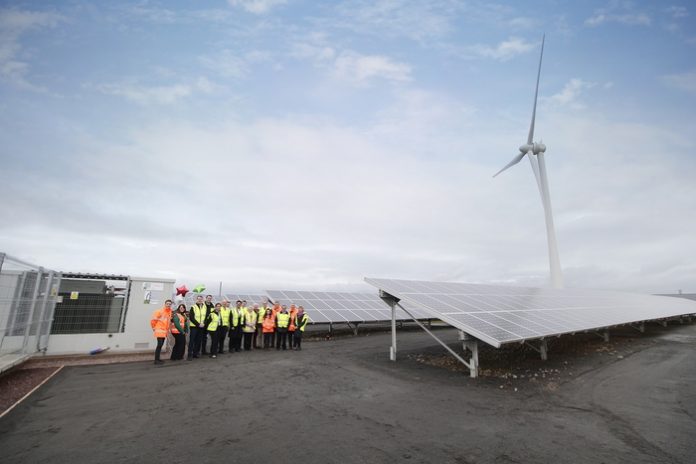A multi-million-pound smart battery system, one of the largest in the UK to be installed at a customer site, was officially launched on Monday (19th February) at Parc Stormy near Bridgend.
It marks a significant milestone in the application of smart battery technology in the UK with capacity to store enough energy to power thousands of Welsh homes when needed, helping to build a low carbon economy in Wales.
The size of three shipping containers, the battery system took three months to build and now provides balancing services to National Grid which helps to regulate the frequency of the UK electricity network.
Leading energy storage developer and smart energy management company KiWi Power chose Cenin Renewables as the location for its 4 MW battery energy storage system (BESS).
Cenin’s 20-acre cluster of integrated clean technologies includes a low carbon cement production facility, a solar farm, an anaerobic digestion plant and a wind turbine.
“This is all about having green energy in reserve and we are delighted to be working with KiWi Power to play our part delivering a reliable, sustainable power source whilst providing local economic development and helping Wales reach its low emissions targets,” says Martyn Popham MD of Cenin.
Continues Popham: “Smart batteries are both green and cost-effective, reducing the need for inefficient backup power stations by allowing excess energy to be stored and used when the sun isn’t shining and the wind has stopped blowing”.
Dignitaries from Wales joined senior representatives from Cenin, KiWi Power, the renewables industry, local landlords and Knight Frank at a launch event at Cenin’s Parc Stormy site on Stormy Down.
“This facility is an exciting addition to KiWi Power’s battery portfolio, and a key part of our strategy to develop, finance, build and monetise the highest value battery systems on customer sites across Europe,” explains Yoav Zingher, CEO of KiWi Power.
“Our state-of-the-art technology enables large power users like Cenin to reap the rewards from battery energy storage, with no upfront investment or risk to them, reducing their bills and their carbon footprint”.



















